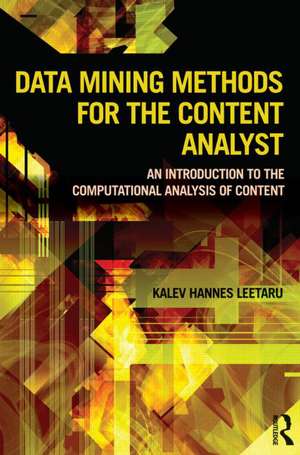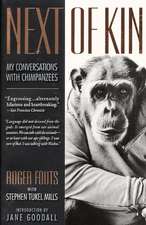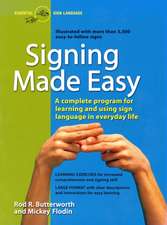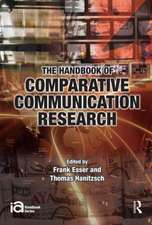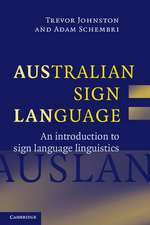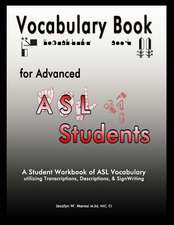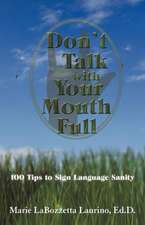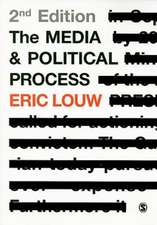Data Mining Methods for the Content Analyst: An Introduction to the Computational Analysis of Content: Routledge Communication Series
Autor Kalev Leetaruen Limba Engleză Paperback – 13 dec 2011
Designed as an instructive reference to computer-based analysis approaches, each chapter of this resource explains a set of core concepts and analytical data mining strategies, along with detailed examples and steps relating to current data mining practices. Every technique is considered with regard to context, theory of operation and methodological concerns, and focuses on the capabilities and strengths relating to these technologies. In addressing critical methodologies and approaches to automated analytical techniques, this work provides an essential overview to a broad innovative field.
| Toate formatele și edițiile | Preț | Express |
|---|---|---|
| Paperback (1) | 379.09 lei 6-8 săpt. | |
| Taylor & Francis – 13 dec 2011 | 379.09 lei 6-8 săpt. | |
| Hardback (1) | 997.73 lei 6-8 săpt. | |
| Taylor & Francis – 13 dec 2011 | 997.73 lei 6-8 săpt. |
Din seria Routledge Communication Series
-
 Preț: 156.78 lei
Preț: 156.78 lei - 9%
 Preț: 575.54 lei
Preț: 575.54 lei -
 Preț: 155.43 lei
Preț: 155.43 lei - 8%
 Preț: 441.77 lei
Preț: 441.77 lei - 8%
 Preț: 415.39 lei
Preț: 415.39 lei - 9%
 Preț: 576.43 lei
Preț: 576.43 lei - 15%
 Preț: 404.22 lei
Preț: 404.22 lei - 8%
 Preț: 495.22 lei
Preț: 495.22 lei - 8%
 Preț: 509.90 lei
Preț: 509.90 lei -
 Preț: 392.96 lei
Preț: 392.96 lei - 8%
 Preț: 516.77 lei
Preț: 516.77 lei - 8%
 Preț: 460.12 lei
Preț: 460.12 lei - 8%
 Preț: 394.36 lei
Preț: 394.36 lei -
 Preț: 424.75 lei
Preț: 424.75 lei - 15%
 Preț: 431.10 lei
Preț: 431.10 lei -
 Preț: 364.94 lei
Preț: 364.94 lei -
 Preț: 363.96 lei
Preț: 363.96 lei - 22%
 Preț: 325.34 lei
Preț: 325.34 lei - 15%
 Preț: 463.49 lei
Preț: 463.49 lei - 15%
 Preț: 464.31 lei
Preț: 464.31 lei -
 Preț: 366.85 lei
Preț: 366.85 lei -
 Preț: 264.53 lei
Preț: 264.53 lei - 16%
 Preț: 247.75 lei
Preț: 247.75 lei -
 Preț: 354.28 lei
Preț: 354.28 lei -
 Preț: 374.27 lei
Preț: 374.27 lei - 22%
 Preț: 321.54 lei
Preț: 321.54 lei -
 Preț: 418.13 lei
Preț: 418.13 lei -
 Preț: 481.52 lei
Preț: 481.52 lei -
 Preț: 442.50 lei
Preț: 442.50 lei -
 Preț: 498.91 lei
Preț: 498.91 lei -
 Preț: 369.95 lei
Preț: 369.95 lei - 24%
 Preț: 133.28 lei
Preț: 133.28 lei - 31%
 Preț: 325.43 lei
Preț: 325.43 lei - 25%
 Preț: 769.37 lei
Preț: 769.37 lei -
 Preț: 447.05 lei
Preț: 447.05 lei - 18%
 Preț: 722.88 lei
Preț: 722.88 lei -
 Preț: 389.60 lei
Preț: 389.60 lei -
 Preț: 249.75 lei
Preț: 249.75 lei -
 Preț: 395.37 lei
Preț: 395.37 lei -
 Preț: 363.96 lei
Preț: 363.96 lei - 18%
 Preț: 1004.72 lei
Preț: 1004.72 lei - 18%
 Preț: 998.71 lei
Preț: 998.71 lei -
 Preț: 380.22 lei
Preț: 380.22 lei - 26%
 Preț: 243.26 lei
Preț: 243.26 lei -
 Preț: 97.53 lei
Preț: 97.53 lei -
 Preț: 242.11 lei
Preț: 242.11 lei - 20%
 Preț: 402.68 lei
Preț: 402.68 lei -
 Preț: 226.33 lei
Preț: 226.33 lei -
 Preț: 386.14 lei
Preț: 386.14 lei -
 Preț: 241.09 lei
Preț: 241.09 lei
Preț: 379.09 lei
Nou
Puncte Express: 569
Preț estimativ în valută:
72.54€ • 75.74$ • 60.03£
72.54€ • 75.74$ • 60.03£
Carte tipărită la comandă
Livrare economică 05-19 aprilie
Preluare comenzi: 021 569.72.76
Specificații
ISBN-13: 9780415895149
ISBN-10: 0415895146
Pagini: 120
Ilustrații: 6 tables
Dimensiuni: 152 x 229 x 8 mm
Greutate: 0.2 kg
Ediția:1
Editura: Taylor & Francis
Colecția Routledge
Seria Routledge Communication Series
Locul publicării:Oxford, United Kingdom
ISBN-10: 0415895146
Pagini: 120
Ilustrații: 6 tables
Dimensiuni: 152 x 229 x 8 mm
Greutate: 0.2 kg
Ediția:1
Editura: Taylor & Francis
Colecția Routledge
Seria Routledge Communication Series
Locul publicării:Oxford, United Kingdom
Public țintă
UndergraduateCuprins
- Chapter 1 - Introduction
- What Is Content Analysis?
- Why Use Computerized Analysis Techniques?
- Standalone Tools Or Integrated Suites
- Transitioning From Theory To Practice
- Chapter 2 - Obtaining And Preparing Data
- Collecting Data From Digital Text Repositories
- Are The Data Meaningful?
- Using Data In Unintended Ways
- Analytical Resolution
- Types Of Data Sources
- Finding Sources
- Searching Text Collections
- Sources Of Incompleteness
- Licensing Restrictions And Content Blackouts
- Measuring Viewership
- Accuracy And Convenience Samples
- Random Samples
- Multimedia Content
- Converting To Textual Format
- Prosody
- Example Data Sources
- Patterns In Historical War Coverage
- Competitive Intelligence
- Global News Coverage
- Downloading Content
- Digital Content
- Print Content
- Preparing Content
- Document Extraction
- Cleaning
- Post Filtering
- Reforming/Reshaping
- Content Proxy Extraction
- Chapter 3 - Vocabulary Analysis
- The Basics
- Word Histograms
- Readability Indexes
- Normative Comparison
- Non-Word Analysis
- Colloquialisms: Abbreviations And Slang
- Restricting The Analytical Window
- Vocabulary Comparison And Evolution / Chronemics
- Advanced Topics
- Syllables, Rhyming, And ‘Sounds Like’
- Gender And Language
- Authorship Attribution
- Word Morphology, Stemming, And Lemmatization
- Chapter 4 – Correlation And Co-Occurrence
- Understanding Correlation
- Computing Word Correlations
- Directionality
- Concordance
- Co-Occurrence And Search
- Language Variation And Lexicons
- Non-Co-Occurrence
- Correlation With Metadata
- Chapter 5 – Lexicons, Entity Extraction, And Geocoding
- Lexicons
- Lexicons And Categorization
- Lexical Correlation
- Lexicon Consistency Checks
- Thesauri And Vocabulary Expanders
- Named Entity Extraction
- Lexicons And Processing
- Applications
- Geocoding, Gazetteers, And Spatial Analysis
- Geocoding
- Gazetteers And The Geocoding Process
- Operating Under Uncertainty
- Spatial Analysis
- Chapter 6 – Topic Extraction
- How Machines Process Text
- Unstructured Text
- Extracting Meaning From Text
- Applications Of Topic Extraction
- Comparing/Clustering Documents
- Automatic Summarization
- Automatic Keyword Generation
- Multilingual Analysis: Topic Extraction With Multiple Languages
- Chapter 7 – Sentiment Analysis
- Examining Emotions
- Evolution
- Evaluation
- Analytical Resolution: Documents vs Objects
- Hand-Crafted vs Automatically-Generated Lexicons
- Other Sentiment Scales
- Limitations
- Measuring Language Rather Than Worldview
- Chapter 8 – Similarity, Categorization and Clustering
- Categorization
- The Vector-Space Model
- Feature Selection
- Feature Reduction
- Learning Algorithm
- Evaluating ATC Results
- Benefits of ATC Over Human Categorization
- Limitations of ATC
- Applications of ATC
- Clustering
- Automated Clustering
- Hierarchical Clustering
- Partitional Clustering
- Document Similarity
- Vector Space Model
- Contingency Tables
- Chapter 9 – Network Analysis
- Understanding Network Analysis
- Network Content Analysis
- Representing Network Data
- Constructing the Network
- Network Structure
- The Triad Census
- Network Evolution
- Visualization and Clustering
Notă biografică
Kalev Leetaru is Senior Research Scientist for Content Analysis at the University of Illinois Institute for Computing in Humanities, Arts, and Social Science and Center Affiliate of the National Center for Supercomputing Applications. He leads a number of large initiatives centering on the application of high performance computing to grand challenge problems using massive-scale document and data archives.
Descriere
This research reference introduces readers to the data mining technologies available for use in content analysis research. Supporting the increasingly popular trend of employing digital analysis methodologies in the humanities, arts, and social sciences, this work provides crucial answers for researchers who are not familiar with data mining approaches and who do not know what they can do, how they work, or how their strengths and weaknesses match up to the strengths and weaknesses of human coded content analysis data. Offering valuable insights and guidance for using automated analytical techniques in content analysis research, this guide will appeal to both novice and experienced researchers throughout the humanities, arts, and social sciences.
